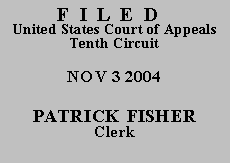

| UNITED STATES OF AMERICA, | No. 04-5076
(D.C. No. 01-CV-336-H) |
Moore must obtain a COA to pursue this appeal. See 28 U.S.C. § 2253(c)(1)(B). To be entitled to a COA, he must make a "substantial showing of the denial of a constitutional right." Id. § 2253(c)(2). To make this showing, Moore must establish that "reasonable jurists could debate whether (or for that matter, agree that) the petition should have been resolved [by the district court] in a different manner or that the issues presented were adequate to deserve encouragement to proceed further." Slack v. McDaniel, 529 U.S. 473, 483-84 (2000) (quotations omitted). Moore has failed to make that showing. For substantially the reasons relied upon by the district court, therefore, we DENY Moore a COA and DISMISS this appeal.
ENTERED FOR THE COURT
David M. Ebel
Circuit Judge
1. Moore now argues that Blakely v. Washington, 124 S. Ct. 2531 (2004), supports this claim for relief. The Supreme Court decided Blakely just after the district court denied Moore § 2255 relief. Because Moore's Blakely argument was not before the district court when it considered his § 2255 motion, we will not address it here. See United States v. Mora, 293 F.3d 1213, 1218 (10th Cir. 2002) (noting, in § 2255 proceeding, that appellate court ordinarily does not consider issues raised for first time on appeal).
2. In his § 2255 motion, Moore asserted additional claims, alleging his trial counsel was ineffective for failing to object to consecutive sentences for two of Moore's 18 U.S.C. § 924(c) convictions, the indictment's failing to specify whether Moore was charged under 18 U.S.C. § 2(a) or § 2(b), the government's withholding evidence, a government's witness's perjured testimony, and the government's failing to prove that the banks that were robbed were federally insured. Moore further alleged that the government falsified evidence it presented against him. Moore, however, does not reassert these claims now on appeal.